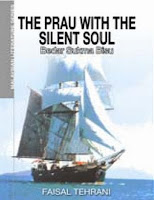
This is another book I picked up in KL, as its back cover copy made it sound like an interesting novel about a woman who takes over a shipping business alongside stories of voyages around Malaysia.
It is occasionally about the first thing.
While, yes, Wefada Marwan is put in charge of her family's business after a succession of accidental deaths, the novel only shows her actually taking charge on pages 110-122 and 169-185, with a few smaller portions dedicated to her anxiety over the large responsibility. In those two chunks, she's shown to be a capable woman who patches up a bad family-business relationship and firmly tells a non-profitable arm of the company that they need to shape up.
The majority of the novel is about the various members of Wefada's family, by blood or by marriage: how they met, how they fell in love (her views on her second husband are followed, a chapter later, by his views on her, sometimes showing two halves of the same scene), how they died or found out about a death, how they suffered, how they dealt with business problems (Wefada narrates that her brother Waqeel made a mistake, and a chapter later there's a flashback to his decision-making leading up to that mistake, and towards the end there's a flashback to the involvement of her uncle). It's quite dull, especially the repetitiveness. Wefada is the only character that I really cared about, but even she's not especially compelling; I liked her uncle, too, but he only gets one scene. The "Stories of voyages in the brilliant era of the Malay-Muslim civilisation" mentioned on the back never materialise.
I did find the characters' faith (Islam) interesting, in the way it affects their decisions and plays an integral role in their lives - largely, I suspect, because I rarely read books about Muslim characters. Especially attention-grabbing is the integration of Islamic practices into economics, as championed by Wefada - Islamic law forbidding interest came up a lot - but this, frustratingly, is usually skimmed over. The rest of the economics (and there's a fair bit of it) is basic, high school level stuff, that I enjoyed only in the way it reminded me of things I already knew. The people discussing it are a renowned Professor and successful businessmen, so the simplicity of their crowd-pleasing arguments is a bit ridiculous. The only other bits I liked were snippets of Malaysian boat-building history and the page about Wefada's belief that Alexander the Great visited Malaysia. The rest, I found boring.
On a line level, the book is riddled with typos, especially concerning the placement of speech-marks, and there are no breaks when the scene jumps across time and country and character-focus.
And, come the end of the novel, I realised it doesn't even possess a narrative arc. Through jumping about, it's shown Wefada just begin to take over the company, alongside various other characters' histories and relationships (and it explains a couple of family mysteries, but only for the reader's benefit; Wefada never learns the truth), and ends without even resolving whether a certain character has just died. (Perhaps the final pages are a metaphor for his survival, perhaps we're meant to assume he died because people on ships captured by pirates are often shot - who knows!) It's as if the author was told,
You have x pages to fill, and on getting close to the final page, panicked, wrote in some waffle about the soul of the titular ship, and that was that.

 I heard of Shirley Lim's Princess Shawl, a children's book set in Singapore and historical Malaysia, from Nurul Huda's article,
I heard of Shirley Lim's Princess Shawl, a children's book set in Singapore and historical Malaysia, from Nurul Huda's article,